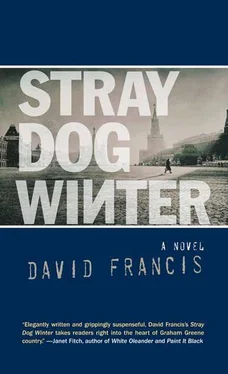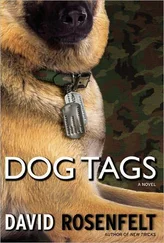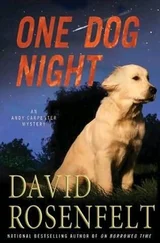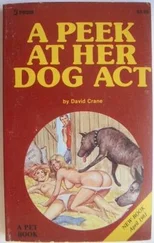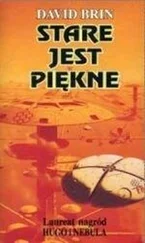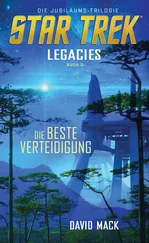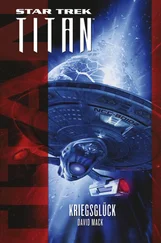The general, panicking, tucked in his studded shirtfront and fumbled for his glasses, his fallen bow tie. He towered over Darcy like a fuming building, wrenched Darcy around so he could see. Next time I clean you up pretty and rip you out a new hole like a real Polish boy. Sweat fogged up the general’s glasses, the savage way he turned his mouth. Where is she?
Darcy lay very still, the tremor rippling all through his body, but all sound suddenly gone from his head. He knew he had been lucky this time, the unexpected voices in the hall.
She told me she’d meet me at Andropov’s funeral, he said, in the square, and if not near the Ploshchad Revolyutsii for the opening of the exhibition. It sounded like the truth.
The general’s face untwisted slightly but a squinting doubt lingered. There will be many at the funeral, he said.
Darcy braced himself against the cot. She said she would find me.
The general leaned down and pulled at Darcy’s greasy hair and Darcy closed his eyes again, flinching. We will be watching you like a glove. Set foot near any embassy, talk with any person and I finish you next time, I split you in pieces. The general took a long last look into Darcy’s eyes and then prepared to leave. Rearranging himself, he lumbered towards the voices outside the door. Fin’s suede mittens, small as a pair of bats, floated from the pocket of his trousers to the floor.
Lubyanka Square
Sunday, 10.30 am
Darcy stood under a high white sky in a wind that chased snow across the square and stung the wound on his neck through his scarf and coat collar. He felt like a hunted species, let go briefly for his tormentors to observe him, in case his kin might emerge from the tundra and lick at his wounds. He never imagined he’d be homesick. His breath and the sky and buildings—everything smoky and white as frozen milk. His sight blurred, searching for the oxidised Lada, but what could he say to Aurelio now? The rabid anise-breathed whispers of the general still fresh, the cavernous sound that now lodged there, a violence behind him like a twisted slingshot, shoving him out into this gelid square as if Fin might dart out from among these sallow figures in black fur hats and usher him off to her coven.
The aches in him deep, his bones as if splintery, he ventured towards the metro entrance, to a single snow-swept food stand, the frosted street lamps like arrows planted in ice. A woman with plastic shopping bags, her face enveloped in a woollen balaclava, the two brown-hatted men in an angle-parked Volga, a sense they all watched. No choice other than to proceed as he’d said he would to the multitude amassing in Red Square. He bought three steaming piroshki from the street vendor who winced at the sight of his cheekbone, bruised black and red as a tsarist flag, but she said nothing, just handed him the first one, steaming lamb and onion buried in pastry. Gde Jaguaroff? he wanted to ask, but didn’t speak either, didn’t chance it, the mustard-coloured building still glowering behind him like a monstrous warning. He stuffed another in his mouth, let the mealy cheese and cabbage heat burn deep inside him, then he kneeled and dipped the napkin to moisten it in the snow. He wiped his face as best he could, dabbed at his cheek and pressed the dampened paper against his neck. He knew he had to keep moving, on among the Muscovites, the other piroshkis pushed deep in his pockets for warmth, his scarf up over his mouth to keep his lips from the fresh pellets of snow. He knew if he didn’t lead them to Fin there’d be no limping out here into this winter a second time; he’d be splayed in his own pooling blood or shipped east over the Urals on a train, the prettiest face in some gulag.
Aurelio, he whispered, glad his lips could still shape the word, but the name was drowned by a crackle from tinny loudspeakers hooked on trees, dirge music piping out into the morning as if it were Darcy’s own death being mourned a day prematurely. The venom from the general’s lips, the repulsive jolting, had Darcy starey-eyed out here in the wind, far from weeping, the fact of it grasping hold.
He merged with a huddle fanning from the window of a Beriozka, where the proceedings in the square were being televised. On the screen, a tribune beneath the clock on Spasskaya Tower with a rose-wreathed casket, then a podium with dignitaries dribbling into their seats, waiting. Armoured vehicles motored past, columns marching with guns in the air past the striped onion domes of St Basil’s. Raincoats and umbrellas covered the square like a field of wet flowers. Alas, poor Yuri, thought Darcy. Vodka so cheap they cleaned their windows with it, called it Andropodka. Alas, poor everyone, he thought.
If he steered them to Fin, he knew he’d not garnered himself any guarantees, just two venues and a couple of hours, a chance in hell. The KGB like a giant bear, pawing at him, no doubt suspecting he’d strung them along. His breath felt shallow, barely reaching his chest in the gathering crowd drawn down the avenue to assure themselves Andropov was gone. Craggy plaster faces strung on a line between the spindly birches and, beneath them, a mask seller who wore a plaster Brezhnev, secured by elastic. He wagged his finger at Darcy, making a speech, and a few people laughed brittle laughs.
Darcy saw a young girl who cradled a big cream handbag leaning against her mother for warmth, and he yearned for her innocence. This quaint-faced girl examining those wooden dolls within dolls, Lenin inside Stalin, Khrushchev inside Brezhnev, men inside men, but there wasn’t an Andropov yet. She stared over at Darcy then moved in closer to her mother, spooked. He ate his second piroshki too fast, felt like he was gagging, the timid retreat of the child had him off-kilter, as if seeing himself from the outside. With a false possibility but not a real plan, just the sense enough would never be sufficient—it wasn’t just Fin they wanted, it was Jobik and his associates, and the general’s own desire to slam Darcy’s face into a smeared concrete corner. The same general at St Anne’s that first day, the Cuban bride whose smile lit up the sanctuary. She says he’s like an animal , Aurelio whispered, as if it were a good thing, but where was the new bride last night, her general on the end of Darcy’s prison bed? An animal, yes, but what sort exactly? How much did Aurelio know?
Darcy tried to stop his mind, thoughts like the sails of spinning windmills. He looked up from the footprints before him to the distant Tomb of the Unknown Soldier, plastic roses in the snow beneath the eternal flame and a boy on the kerb in uniform chatting up a girl in a leather coat that had I Shot JR painted on the back. A Fin kind of girl, a photo if Darcy had still had his Pentax, but it was too late to capture the ironies now. He’d missed the Moscow he could have visited, the one he’d hoped for, the majesty of her winter, but the sight of the couple reminded Darcy it had existed all along, the distant swirl of confetti eddying about newlyweds in fur capes near the tomb, celebrating on a Soviet day of mourning. The sights invoked in him a strange invigoration as he rounded the corner into the square, to the pageant of Andropov’s funeral unfurling in real life, a quilt of wet umbrellas extending towards the domes of St Basil’s. The din of the dirge now eclipsed by a battalion of soldiers doing that straight-leg step across the frosted cobblestones; it gave Darcy that shivery feeling like Germany, the trammelling force of them, a thousand uniforms, generals. He waded into the depths of the crowd, weaving sideways but quietly forward, as if searching for Fin. The idea of disappearing seemed rash but suddenly possible—return to the apartment, the list of restaurants in Fodor’s. Find the Jaguaroff, get there alone. He knitted himself among dripping umbrellas, furs and stolid faces, his heart thumping up into his clamouring head. He hunkered, stock-still amid the rugged-up multitude, breathless, his eyes anchored on the distant platform, the casket wrapped in a rosecovered Soviet flag and, behind it, the rows of dignitaries.
Читать дальше
